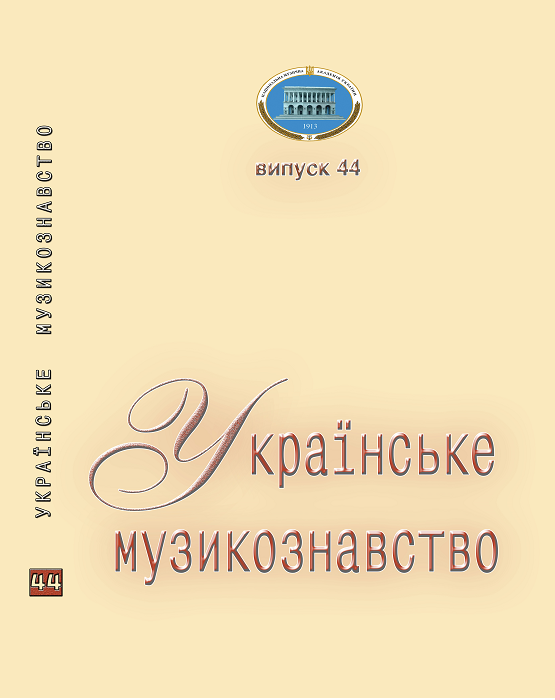Works of Turkish composers for ethnic instruments accompanied by orchestra: Dialogue of East and West
DOI:
https://doi.org/10.31318/0130-5298.2018.44.0.152846Keywords:
music of the Ottoman Empire, Turkish composers' school, ud, baglama, Turkish ethnic instruments, musical form, "Turkish Five"Abstract
Relevance of the study. A school of classical music composition was was first seen in Turkish Republic in the first half of the 20th century. In this figure, a group of composers are called as "Turk Besleri” (“The Turkish Five”). They are the creators of Turkish polyphonic classical music and many masterpieces. But, the works written for only ethnic instruments are very few. Such works can contribute to the popularity of Turkish instruments in the classical music world.
Analysis of the last researches. This theme is hardly ever researched. H.F. Alnar's Conçertos for qanun" can be seen only in some studies.
Main objective of the study. The aim of this work is to reveal works accompanied by orchestra composed by Turkish composers for ethnic instruments. Another goal of this research is to encourage composers to create such works and it will make Turkish music more recognizable in the classical music world.
The inclusion of Turkish musical instruments, melodies and rhythms in the Western music forms contributes to the recognition of Turkish music on the classical platform in the world, in line with the "East-West synthesis" principles in music art.
Findings of researches. Only five works can be reached composed in this style. This work is conducted on this limited source that the researcher can reach.
Results and conclusions There is a potential for writing such works in Turkey. Both current members can benefit from “East” and “West” music synthesis. It is suggested that such studies should be done in order to make the Anatolian music culture known all over the world. In this study, there has been a research within the scope of polyphonic musical works, which started during the Ottoman period and continued during the Republican period, on Turkish polyphonic compositions composed by Turkish composers for Turkish musical instruments. For the development of contemporary Turkish music in the Republican era, the artists who are called the "Turkish Fives" and who made great efforts on reaching this present contemporary level of music were sent to Europe for education by state scholarship. But, the works written for only ethnic instruments are very few. The aim of this work is to reveal works accompanied by orchestra composed by Turkish composers for ethnic instruments. Another goal of this research is to encourage composers to create such works and it will make Turkish music more recognizable in the classical music world.
References
Akkas, S. (1998), “Cumhuriyet Donemi Turk Muziginin Turk Muzik Egitimindeki Yeri” [“The Place of Republican Period of Turkish Music in Turkish Music Education”], 4. Istanbul Turk Muzigi Gunleri [“4.th Istanbul Turkish Music Days”], T.C. Kultur Bakanligi Kultur Eserleri, Ankara, 1998, 12 s. [in Turkish]
Aksoy, B. (1994), “Avrupalı Gezginlerin Gozuyle Osmanlilarda Musiki” [“Music in the Ottoman Empire through the Eyes of European Travelers”], Pan yayıncilik, Istanbul, 441 s. [in turkish]
Alnar, H. (1951) “Kanun concertosu” [Score], [“Concerto for the Kanun and the Orchestra”]. El yazması, Ç.Tanrıkorur arşivinden alıntı, (2014), manuscript 4. Altınkopru, H. (2009), “Hasan Ferit Alnarin Yaraticiligi “Turk Besleri Kontenkstinde” [“Hasan Ferit Alnar's Creation in Context of "Turkish Five"”], PhD diss. doktora tezi, sanat bilimi ihtisas No 17.00.02, Azerbaycan Respuplikası Tehsil Nazirliyi, U.Hacıbeyli ad. Bakı Musiqi Akademiyası, Baku, 119 s. [in azerbaijanian]
Baydar, E. (2010), “Osmanlinin Avrupa Muzisyenleri” [“European Musicians of the Ottoman Empire”], Alfa Basin Yayin Dagitim, Istanbul, 311 s. [in turkish]
Balci, O. (2010), Kanun ve orkestra için “Istanbul hatırası” [Score] [“Memory of Istanbul”]. El yazması, O. Balcı’nın şahsi arşivinden alıntı (2014), manuscript 7. Beken, M. (2006), “Ud concertosu” [Score], [“Oud concerto”]. Ei yazması, M.N. Beken’in şahsi arşivinden alıntı (2014), manuscript
Gazmihal, M. (1959), “Musiki Sozlugu” [“Musical Dictionary”], Istanbul, MEB Konservatuvar Yayinlari, Nisan, 288 s. [in turkish]
Gedikli, N. (1999), “Bilimselligin Merceginde Geleneksel Musikilerimiz ve Sorunlari” [“Traditional Music and his Problems in Objective of Science”], Ege Universitesi basımevi, Izmir.122 s. [in turkish]
Torun, M. (1990), “Ud ve yaylılar için süit” [Score], [“Suite for oud and strings”] El yazması, M. Torun’ın şahsi arşivinden alıntı (2014), manuscript
Ozdemir, C. 2004, “Bağlama conçertosu” [Score], [“Concerto for the baglama”] El yazması, E.Erzincan’ın şahsi arşivinden alıntı (2014), manuscript




